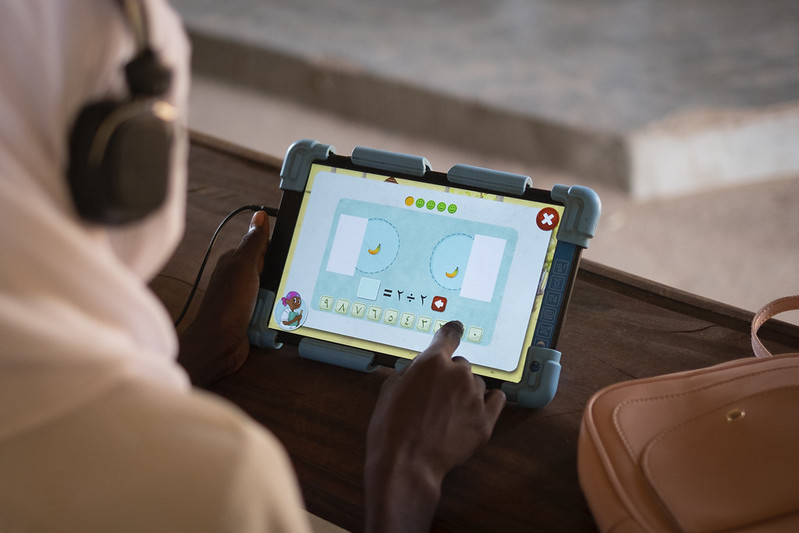Revolutionizing Learning: AI in Kenyan education
 Kenya has emerged as a hotspot for educational technology innovation in Africa. Artificial intelligence (AI) is revolutionizing the country’s learning landscape. AI in Kenyan education reshapes how students learn and how educators teach, using software ranging from individualized tutoring to data management and analysis algorithms.
Kenya has emerged as a hotspot for educational technology innovation in Africa. Artificial intelligence (AI) is revolutionizing the country’s learning landscape. AI in Kenyan education reshapes how students learn and how educators teach, using software ranging from individualized tutoring to data management and analysis algorithms.
The Competency-Based Curriculum
Recognizing the importance of preparing students for the digital age, the Kenyan government introduced the Competency-Based Curriculum (CBC) in 2017. This new approach shifts away from traditional high-stakes exams and rote memorization. Instead, it focuses on enhancing learning comprehension and practical skills. The CBC emphasizes digital literacy and coding, incorporating tools like Scratch for programming and data handling. By integrating AI and digital literacy into the national curriculum, Kenya takes significant steps to equip its students with the skills they will need in an increasingly digital world.
Kytabu
Kytabu has developed several AI-powered tools designed specifically for the African educational context. Its most acclaimed product, SOMANASI, is an AI-driven personal tutoring tool that provides personalized curriculum materials, course programs and assessment questions. The application lets students rent affordable textbooks, audiobooks, assessments and courses, all accessible in the AI-supported mobile app. By enabling students to learn at their own pace, SOMANASI makes education more accessible and engaging.
Additionally, HODARI, assists teachers with grading, lesson planning and administrative tasks. The software connects individual student data from assessments to the Kytabu information management system. AI in the product helps teachers understand kids’ individual needs by analyzing performance data and identifying strengths and weaknesses. By automating these time-consuming processes, HODARI allows teachers to focus more on what they do best: teaching and supporting their students.
M-Shule
M-Shule is an edtech platform that uses AI and SMS technology to deliver personalized learning content to Kenyan primary school students, aiming to improve education outcomes in areas with limited internet access. Students interact with an AI bot that prompts them with lessons and questions they answer by text. The system analyzes the data in real-time, allowing program teams and supporting organizations to track student performance and provide targeted support where needed. M-Shule has reached more than 45,000 users, including 13,000 households from 30 Kenyan counties.
Mosabi: Financial Education for the Masses
Recognizing that education extends beyond traditional subjects, Mosabi leverages AI to provide tailored financial and business education to underserved communities in emerging markets. Lessons cover areas like financial literacy, entrepreneurship and business management. Its mobile platform uses AI-driven analytics to track user progress. Furthermore, personalized learning experiences, help small business owners and entrepreneurs improve their financial health.
Endless OS Foundation
The Endless OS Foundation provides a Linux-based operating system with preloaded educational content, productivity tools and entertainment designed for communities without internet access. Its AI capabilities curate content based on student interests, fostering curiosity-driven learning and greater engagement. Since its creation, the initiative has established 600 computer labs. This growth has significantly expanded access to digital education and resources for students across Kenya and other countries where it operates.
Challenges and Future Prospects
While the integration of AI in Kenyan education shows great promise, challenges remain. A recent study across 38 out of 47 Kenyan counties found that while teachers generally have a positive attitude toward AI, many lack confidence in implementing these platforms in their classrooms. To address this, experts recommend revising teacher training curricula to include AI components. Furthermore, they suggest designing professional development programs to build teachers’ confidence in AI.
As Kenya continues to embrace AI in education, the potential for transformative change is immense. From personalized learning experiences to more efficient school management, AI helps create a more inclusive, engaging and effective education system for all levels.
Michael Murungi, Government Affairs and Public Policy Lead for Eastern Africa at Google states, “One of the biggest opportunities AI has in education is the ability to personalize learning and for the teacher to curate the learning experience for the child based on the child’s needs.”
– Lauren Thompson
Lauren is based in San Francisco, CA, USA and focuses on Technology and Global Health for The Borgen Project.
Photo: Flickr
